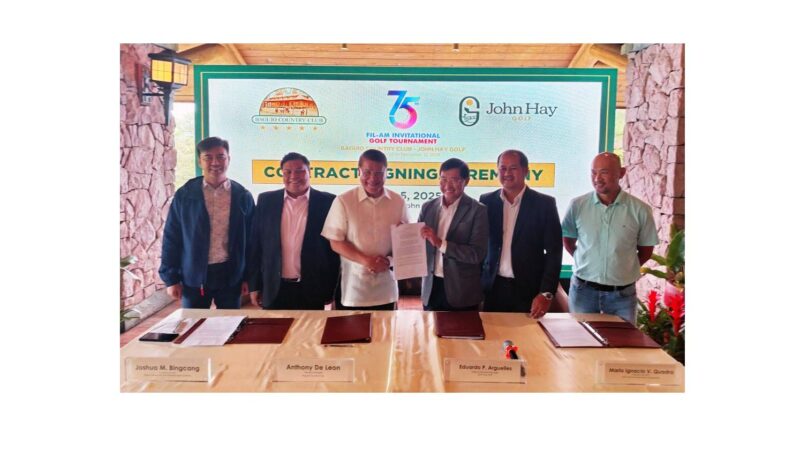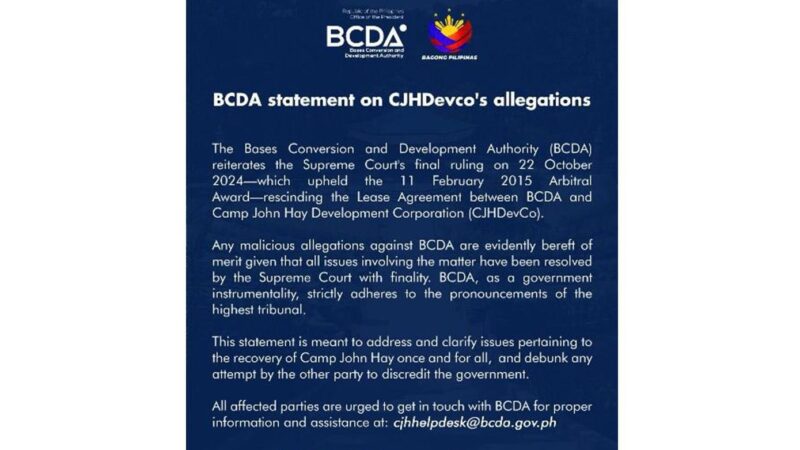Baguio STP Rehab costs $58.19M, according to ADB study
The total project cost for the rehabilitation of the city’s sewage treatment plant (STP) and its sewage network is 58.19 million USD, according to the feasibility study undertaken by the Asian Development Bank (ADB).
Egis, the company working with ADB for the said undertaking, presented to the city council last Monday the initial results of its feasibility study.
The study proposed that LGU-Baguio shall settle the loan in 19 installments. The amount to be paid by the local government every year starting 2031 is PhP 147.01 million.
Earlier, the city’s executive officials announced they have been negotiating with the Tourism Infrastructure and Enterprise Zone Authority (TIEZA) for the acquisition of a loan to be able to provide adequate funds for the realization of the proposed rehabilitation of the Balili STP and the revamp of the city’s sewerage system.
TIEZA is the partner agency of the city government for the implementation of its sewerage projects. A paying scheme has been arranged where TIEZA shall obtain a loan from ADB on behalf of the city, then the city government shall reimburse the amount of the said loan to TIEZA.
The project is scheduled to be implemented within a five-year period from 2022 to 2026.
One component of the proposed project is a tariff reform program. The financial analysis made by Egis suggested that there should be an increase in the city’s sanitation tariffs by 70%, three times every five years starting 2023. This means that the sanitation fees shall be increased to 17.9/m3 in 2023, P30.3/m3 in 2028, and P51.6/m3 in 2033. The tariffs will increase at the rate of inflation by 15% every five years.
The tariff increase is expected to gradually cover the operational expenses of the STP and the annual loan reimbursement.
Based on the initial results of the financial analysis made by Egis, City Budget Officer Leticia Clemente estimated that the city government will be subsidizing the operation of the STP up to 2037. Starting in 2038, the city is expected to start realizing an annual net income from the collection of the sanitation fees that can be used to augment the city’s fund for loan reimbursement.
However, this financial projection is tentative. More accurate figures will be derived from the final financial analysis by Egis, Clemente said.
The said tariff increase shall require the passage of an ordinance by the city council.
According to the project plan presented by Egis, the existing STP will be demolished in phases to allow the construction of a new facility with an increased capacity and a more expanded site. The up and running STP uses an obsolete technology that cannot keep up with the ever-increasing volume of wastewater coming from the different corners of the city.
Aside from the rehabilitation of the facility, its sewage network will also be improved, with 11.3 km of the main sewers to be replaced through this project.
Atty. Rhenan Diwas, City Environment and Parks Management Officer, said a septage management system will also be developed through this multi-billion project in order to service households that are not directly connected to the Balili STP.
Tom Kendell, Team Leader of Egis’ consultancy team, said that septic tanks will be emptied more regularly and that the septage will be treated more adequately to avoid any leakage that may potentially harm the environment and its inhabitants.
Kendell said the project will introduce an equity program that will offer cheaper yet efficient services to the consumers, adding that septage services are seven times more expensive than sewage services.
“The project will improve the sanitation services in the city and will reduce the number of households that are reliant on septic tanks,” he stated.
With its upgrade, the Balili STP will also be able to take in and treat septage transported from the other three catchments; these are Asin-Gallano River, Bued River, and Ambalanga River.
The study revealed that only around 10% of Baguio’s population is connected to the current sewage network and that only 22% of the fecal waste produced in the city is adequately treated.
Furthermore, sludge management will be formulated under this project where the city government can profit from the sale of fertilizers made from sewage sludge.
Diwas and Mayor Benjamin Magalong disclosed that the water quality of the city’s rivers is extremely poor and is not up to par with the standards set forth by the Department of Environment and Natural Resources – Environmental Management Bureau (DENR-EMB).
Data from DENR-EMB-CAR showed that the fecal coliform levels of Balili River and Bued River are worse than that of Manila Bay.
By design, the facility’s capacity is 8,600 m3/day but it is only treating 6,000 m3/day which is not compliant with the DENR-EMB requirements. With its rehabilitation and expansion, the STP’s capacity will reach up to 12,000 m3/day, Diwas said.
Magalong said the city has been discharging its untreated sewage into the rivers due to the very limited capacity of the current STP which is now more than three decades old.
“We have been contaminating everything downstream. It is our moral obligation to treat our wastewater before we dump it to our rivers,” Magalong stated.
The project will have to be approved by the National Economic and Development Authority (NEDA). One of the requirements by NEDA is an endorsement from the local legislative body.
Granting the request of the executive body, the city council passed a resolution endorsing the project to NEDA subject to conditions. One of the conditions was for the executive body to transmit to the council all necessary documents related to the project for review.
Meanwhile, Magalong and Diwas lamented the impending fines the city government will have to pay for its possible non-compliance with the provisions of DENR Administrative Order 2016-08 (Water Quality Guidelines and General Effluent Standards of 2016).
DAO 2016-18, pursuant to Section 19e and 19f of Republic Act 9275 (otherwise known as the Philippine Clean Water Act of 2014), prescribed water quality guidelines intended to maintain and preserve the quality of all water bodies based on their intended beneficial usage and to prevent/abate pollution and contamination to protect public health, aquatic resources, crops, and other living organisms.
The law provides that any entity who commits any violation of the prescribed guidelines and standards shall be fined P10,000.00 per day or P3.650 million per year of violation as the minimum penalty amount, or 200,000.00 per day or P73 million per year of violation as the maximum penalty amount.
According to Diwas, an action plan mapping out the completion of the proposed rehabilitation of the city’s STP was submitted to DENR in 2016.
A grace period of five years was given to all entities provided they submit their compliance action plan. The grace period lapsed on June 18, 2021.
The implementation of the city’s action plan should have commenced not later than June 18, 2021, in consideration of the 5-year grace period. However, the rehabilitation of the city’s STP has not yet commenced to date.
The city government appealed to DENR Secretary Roy Cimatu for the extension of the moratorium, however, Cimatu denied the appeal.
In his letter to Magalong, Cimatu stated, “upon lifting the grace period, regular compliance is expected and any violation committed beyond the grace period is subject for the imposition of fines and penalties in accordance with applicable rules and regulations.”
Magalong said the city is in “dire situations” insofar as wastewater management is concerned.
The chief executive said there is a need to implement the project at the soonest time possible. –Jordan G. Habbiling







